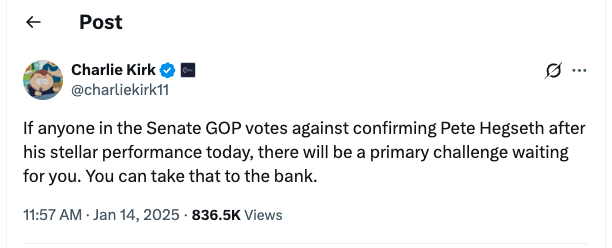
Just a few weeks ago, North Carolina Sen. Thom Tillis announced his retirement amid opposition to the Big, Beautiful Bill and threats of a primary challenge from President Trump. Now, according to Politico, there’s growing speculation that Iowa Sen. Joni Ernst may follow suit and decline to seek re-election in 2026.
If that happens, she would join an ever-growing list of cooperative-minded politicians who are calling it quits in the face of unbearable polarization and gridlock, including Sens. Joe Manchin, Mitt Romney, and Kirsten Sinema, among many others. It would also mark yet another example of the Primary Problem in action. Even though huge majorities of voters say they want our elected leaders to be bipartisan and to put country over party, our election system discourages it. In other words, while most voters say they want more Sen. Ernsts, party primaries are set up to drive them out.
When Ernst was elected in 2014, she was hailed as a rising star in the Republican Party. Just weeks after being sworn in, she delivered the official GOP response to President Obama’s State of the Union. Over the next decade, Ernst proved to be a reliable Republican vote, siding with President Trump around 90% of the time. But like Tillis, she also demonstrated a consistent willingness to work across the aisle. It's this bipartisan, independent streak that has now put her in the crosshairs.
Ernst’s fate may have been sealed earlier this year, when she expressed potential opposition to Trump’s nomination of Pete Hegseth as Secretary of Veterans Affairs. The backlash was immediate and unforgiving. Trump-aligned operatives threatened her with a primary challenge, resulting in seemingly relentless harassment online and in her home state of Iowa. Ultimately, she voted to approve Hegseth. But by then, the message was clear.

For a decorated veteran and sitting U.S. senator to feel cornered by her own party’s base for even considering a vote of conscience is a damning indictment of our political incentives.
Tillis and Ernst are not anomalies. They are part of a broader pattern: Lawmakers who stray from the party line (or even simply flirt with it) are being forced out of office. The discouraging part? They’re not being forced out by the majority of voters, but by a small, hyper-partisan slice of primary voters.
This is the Primary Problem: Most general elections across the country are uncompetitive, meaning the primary is the only contest that matters. The voters that turn out in party primaries tend to be more ideologically extreme than the general electorate. As a result, candidates and elected officials are increasingly forced to prioritize partisan purity — catering to those primary voters instead of the majority of their constituents.
If we, the voters, want a government that reflects the will of the people, not just the most partisan among us, we must fix how we elect our leaders. One proven solution: replace party primaries with open, all-candidate primaries. In these systems, all candidates appear on the same ballot, and all voters, regardless of party, get to participate. The top finishers, no matter their party, advance to the general election.
This approach frees representatives to lead with courage and work across the aisle when it is in the best interests of voters without fear of party retribution. It strengthens accountability to all voters, not just a select few. Until we change the incentives, we risk losing good leaders to a bad system.

Stay up-to-date on the latest news and resources from Unite America.